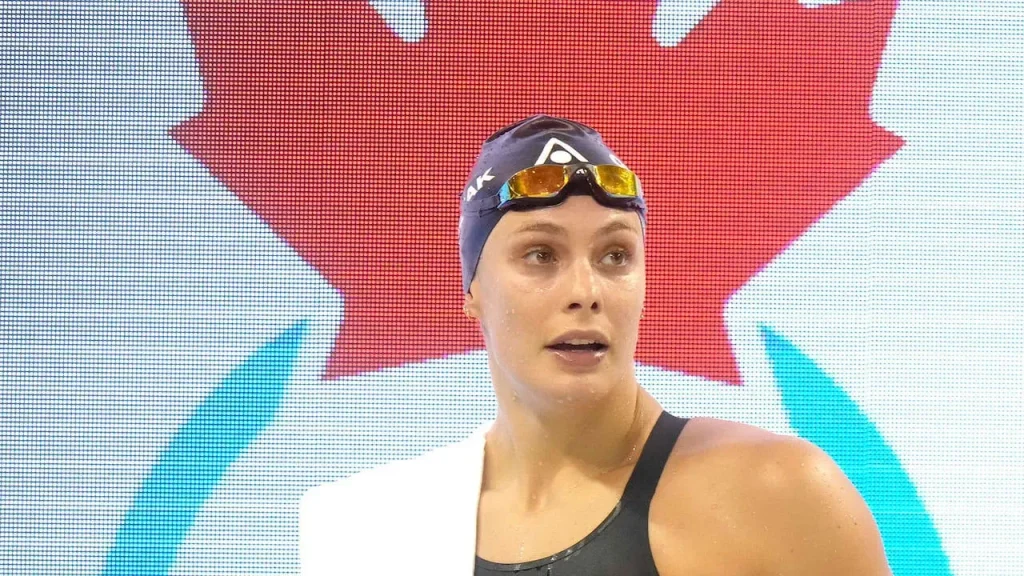Penny Oleksiak’s recent anti-doping violation news has shocked her fans and the swimming community alike. The International Testing Agency has reported that the Olympic swimmer has recorded three whereabouts failures in a 12-month period, raising concerns during a pivotal time leading up to the World Aquatics Championships. As a result of this doping case, Oleksiak has agreed to a voluntary provisional suspension while she navigates the implications of these violations, emphasizing her commitment to being a clean athlete. In her public statements, she firmly denied any use of banned substances, asserting that the issue centers around administrative errors rather than doping. This incident highlights the rigorous expectations placed on athletes regarding their whereabouts and the strict adherence to anti-doping rules that govern competitive sport.
The controversy surrounding Penny Oleksiak involves significant allegations related to her adherence to anti-doping regulations. This situation arises as Oleksiak faces scrutiny for a series of whereabouts failures, which, while not linked to prohibited substances, nonetheless signify a breach of the regulations set forth by governing bodies in sports. The case underscores the critical nature of monitoring athlete locations to facilitate random drug testing. Such mishaps can severely affect an athlete’s eligibility, emphasizing the stark reality that even unintentional oversights can lead to serious consequences. As the investigation proceeds, the focus remains on the implications of such administrative slip-ups in the realm of competitive swimming.
Penny Oleksiak’s Anti-Doping Violation: Understanding the Situation
Olympic swimmer Penny Oleksiak has come under scrutiny following an apparent anti-doping rule violation. The International Testing Agency (ITA) has reported that Oleksiak recorded three whereabouts failures within a 12-month period from October 2024 to June 2025. These failures are significant as they indicate difficulties in consistently updating the necessary information regarding her location for mandatory drug testing. Oleksiak has been placed under a voluntary provisional suspension while she navigates this complex situation, allowing her the opportunity to explain her circumstances regarding each failure.
The implications of such violations are far-reaching. Even in the absence of any banned substance in her system, the World Anti-Doping Code categorizes Whereabouts failures as serious breaches that can affect an athlete’s eligibility. Penny Oleksiak’s case reflects the strict adherence to anti-doping regulations that athletes must adhere to. As a member of the Registered Testing Pool, she is obligated to provide timely and accurate whereabouts information, failing which she risks significant penalties including suspension and potential sanctions.
What Are Whereabouts Failures in Anti-Doping Regulations?
Whereabouts failures represent a unique aspect of anti-doping regulations aimed at ensuring clean sport. According to the World Anti-Doping Agency (WADA) guidelines, athletes are required to inform authorities of their location at all times, allowing for random drug testing without prior notice. A Whereabouts failure occurs when an athlete fails to provide this information accurately, which can result in three missed tests or filing failures within a 12-month timeframe. This aspect of anti-doping emphasizes the responsibility athletes hold beyond just participating in their respective sports; they must also comply with rigorous anti-doping protocols.
In Penny Oleksiak’s case, her three recorded whereabouts failures have raised critical questions about compliance and athlete management. Athletes may consider their lack of awareness or administrative errors as mundane oversights, yet these can lead to significant consequences. The strict enforcement of these rules aims to deter doping practices by ensuring a reliable system of monitoring athletes. The situation necessitates a clear understanding of each athlete’s obligations and encourages them to remain vigilant regarding their whereabouts at all times.
The Role of the International Testing Agency in Anti-Doping
The International Testing Agency (ITA) plays a pivotal role in maintaining the integrity of sports through rigorous anti-doping measures. Tasked with overseeing testing and compliance, the ITA is responsible for ensuring that athletes, including elite competitors like Penny Oleksiak, adhere to the World Anti-Doping Code. The agency facilitates testing logistics, administers the processes for handling violations, and supports athletes in understanding their rights and responsibilities. Through such frameworks, the ITA aims to promote a level playing field in competitive sports and safeguard the principles of fair competition.
In light of the recent developments involving Oleksiak, the ITA’s involvement underscores the complexity of anti-doping cases. With the athlete facing a voluntary provisional suspension, the agency’s guidance remains critical. As the proceedings unfold, the ITA will ensure all parties are informed while emphasizing the importance of due process. This helps preserve the ethos of clean sport, allowing athletes to defend their positions while upholding the standards set forth within anti-doping regulations.
Navigating a Voluntary Provisional Suspension: What It Entails
A voluntary provisional suspension like the one accepted by Penny Oleksiak marks a significant choice for athletes facing potential anti-doping violations. This suspension allows athletes to step back from competition while the investigation process occurs, rather than having immediate sanctions imposed. For Oleksiak, this means withdrawing from high-profile events such as the World Aquatics Championships and providing her the opportunity to clear her name without the burden of ongoing competition during the inquiry.
This scenario poses both emotional and physical challenges for athletes. By choosing a voluntary provisional suspension, they not only demonstrate a commitment to transparency but also a desire to comply with the investigation process. Oleksiak’s case illustrates the importance of this choice as it can influence the outcome of any imposed sanctions, especially when an athlete asserts they are a clean competitor and have made an administrative error rather than engaging in deliberate misconduct.
The Impacts of Doping Violations on Athletes’ Careers
Doping violations, even in the absence of actual doping offenses, can have serious repercussions for an athlete’s career. In the case of Penny Oleksiak, the implications of the anti-doping rule violation could affect her reputation, sponsorships, and future competitions. Athletes invest years of hard work and dedication to their sports, and a blemish on their record due to administrative mistakes or miscommunications can overshadow their accomplishments.
Moreover, the public and media scrutiny that follows high-profile doping cases complicates an athlete’s return to competition. As seen with Oleksiak’s announcement regarding her clean athlete statement, clarity and transparency become paramount to restoring trust with fans and sponsors. The long-term impacts of such violations might require an athlete to rebuild their image, reinforcing the importance of compliance with anti-doping rules and proactive communication with the governing bodies of their sports.
The Importance of Clean Athlete Statements
Clean athlete statements serve as a powerful affirmation of an athlete’s commitment to fair competition and the integrity of their sport. For Penny Oleksiak, publicly declaring her stance as a clean athlete amidst the turmoil of an anti-doping case is essential. It not only reinforces her dedication to ethical practices but also reassures supporters that the headline surrounding her whereabouts failures pertains to administrative issues rather than substance abuse.
Such statements reflect the athlete’s desire to maintain a clean image and actively engage with the broader conversation about doping in sports. By emphasizing their integrity, athletes like Oleksiak can help normalize the discussion around compliance and awareness of anti-doping regulations. These declarations can act as a bridge between athletes and governing bodies, fostering an environment where athletes are held accountable yet supported in their journey towards maintaining clean sport.
The Role of Swimming Canada in Supporting Athletes
Swimming Canada plays a crucial role in supporting athletes facing doping violations or other administrative issues, as highlighted by their response to Penny Oleksiak’s situation. Their public statement, reaffirming belief in Oleksiak as a clean athlete who experienced an administrative mistake, showcases the importance of institutional backing during challenging times. Organizations like Swimming Canada are essential in providing athletes with resources, guidance, and advocacy throughout the anti-doping process.
Furthermore, this support extends to fostering a culture of compliance and education among athletes. Swimming Canada emphasizes the importance of understanding anti-doping regulations and encourages athletes to be proactive in managing their whereabouts information. By promoting such dialogues, governing bodies can enhance adherence to anti-doping rules and mitigate risks associated with inadvertent violations, ultimately strengthening the integrity of competitive swimming.
Future Implications of Oleksiak’s Anti-Doping Case
As the proceedings surrounding Penny Oleksiak’s anti-doping rule violation unfold, the future implications for her career and the broader swimming community will be significant. Depending on the outcome of her case, Oleksiak may face a range of sanctions that could potentially affect her eligibility for upcoming competitions, including the Paris Olympics. The importance of these proceedings not only lies in their impact on Oleksiak but also in the message they send to other athletes about the importance of adhering to anti-doping regulations and maintaining accurate whereabouts.
Moreover, Oleksiak’s case may prompt a reevaluation of how governing bodies address administrative errors in the context of doping violations. There may be a growing demand for policies that prioritize education, communication, and support for athletes to prevent future occurrences. As such, whether Oleksiak resumes her swimming career after resolving this issue will resonate beyond her personal journey, influencing how anti-doping rules are enforced and perceived across the sport.
The Intersection of Doping Violations and Athlete Mental Health
The intersection of doping violations and athlete mental health is a critical area of concern that has gained increasing visibility. For athletes like Penny Oleksiak, being involved in an anti-doping case can lead to significant psychological stress, anxiety, and uncertainty about their future. The scrutiny from the public and media can exacerbate these pressures, making it essential for athletes to have mental health resources available during such challenging times.
Acknowledging the mental strain of facing potential sanctions, organizations and sports associations must prioritize mental health support for athletes navigating doping violations. Integrating mental health resources, counseling, and support systems can aid athletes in coping with the scrutiny and stress of an anti-doping case. In Oleksiak’s situation, ensuring access to mental health support can help her manage the emotional challenges she faces while seeking resolution and clarity.
Frequently Asked Questions
What is the Penny Oleksiak anti-doping violation about?
The Penny Oleksiak anti-doping violation refers to an announced rule violation by the International Testing Agency due to three recorded whereabouts failures within a 12-month period. This situation does not involve banned substances but questions her compliance with the whereabouts reporting requirements.
What are whereabouts failures in the Penny Oleksiak doping case?
In the context of the Penny Oleksiak doping case, whereabouts failures occur when an athlete misses drug tests or fails to provide accurate information about their location for testing. These failures are classified as anti-doping rule violations according to the World Anti-Doping Code.
How did the whereabouts failures affect Penny Oleksiak’s eligibility?
Penny Oleksiak’s whereabouts failures could impact her eligibility to compete as they constitute an anti-doping rule violation. Even though she has never tested positive for a banned substance, three missed tests within a year can lead to sanctions.
What is the significance of a voluntary provisional suspension for Penny Oleksiak?
The voluntary provisional suspension accepted by Penny Oleksiak means she will not compete until the situation surrounding her anti-doping rule violation is resolved. This suspension is crucial as any potential sanctions will be reduced by the time she serves during this voluntary period.
What did Penny Oleksiak say regarding her clean athlete statement?
In her clean athlete statement, Penny Oleksiak affirmed that she has always been a clean athlete and that her current situation revolves around discrepancies in her whereabouts information, not the presence of banned substances.
What support has Swimming Canada offered in regard to the Penny Oleksiak doping case?
Swimming Canada has expressed support for Penny Oleksiak amid the doping case, emphasizing their belief in her integrity as a clean athlete and acknowledging that her whereabouts failures were an administrative mistake rather than an intentional doping violation.
What are the consequences of a whereabout failures violation for athletes like Penny Oleksiak?
Consequences of a whereabouts failures violation, such as the case with Penny Oleksiak, can include sanctions that impact competition eligibility, especially as the World Anti-Doping Code categorizes these failures as serious offenses within the anti-doping framework.
How do whereabouts failures impact the integrity of doping control in sports?
Whereabouts failures impact the integrity of doping control by ensuring athletes are accessible for unannounced drug testing, thereby upholding fair play. Cases like Penny Oleksiak’s highlight the need for accurate communication to prevent violations.
What steps can Penny Oleksiak take to resolve her anti-doping rule violation?
To resolve her anti-doping rule violation, Penny Oleksiak can present her explanations for each of the three whereabouts failures. Engaging in transparent dialogue with the International Testing Agency and complying with their processes is vital for her case.
What has been the reaction to Penny Oleksiak’s decision to withdraw from the World Aquatics Championships?
Following her decision to withdraw from the World Aquatics Championships, related to her anti-doping rule violation case, both the International Testing Agency and Swimming Canada have refrained from further comments, while her supporters continue to affirm her status as a clean athlete.
| Key Point | Details |
|---|---|
| Notification of Violation | Penny Oleksiak has been notified by the International Testing Agency (ITA) about an anti-doping rule violation. |
| Whereabouts Failures | Oleksiak recorded three whereabouts failures from October 2024 to June 2025. |
| Voluntary Suspension | She agreed to a voluntary provisional suspension while the case is resolved. |
| Right to Explanation | Oleksiak has the right to explain her whereabouts failures. |
| Support Statements | Swimming Canada supports Oleksiak, stating she is a clean athlete. |
| Possible Sanctions | Any sanction may be reduced by the time of her provisional suspension. |
| Administrative Mistake | The case revolves around alleged administrative errors, not banned substances. |
Summary
Penny Oleksiak anti-doping violation has brought significant attention to the importance of accurate whereabouts reporting for athletes. As a top swimmer, Oleksiak’s case highlights the potential consequences of administrative errors in the anti-doping framework. While she maintains her status as a clean athlete, the incident serves as a reminder that keeping one’s whereabouts updated is crucial for athletes in the Registered Testing Pool to avoid violations that can affect eligibility.



